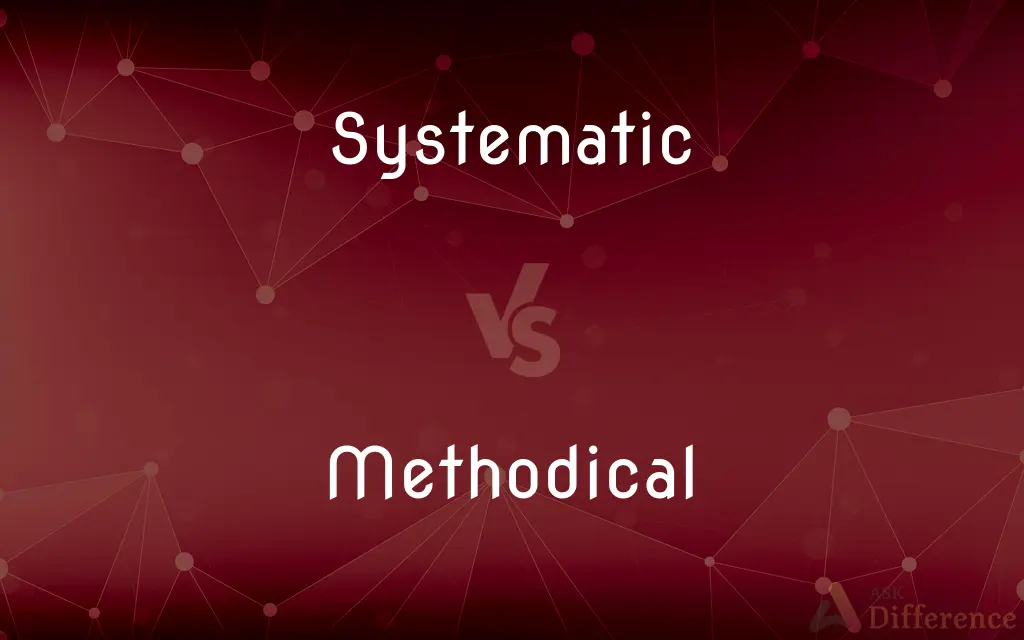Systematic vs. Methodical — What's the Difference?
By Fiza Rafique & Maham Liaqat — Updated on March 11, 2024
Systematic focuses on following a fixed plan or system, while methodical emphasizes thorough, orderly procedures.

Difference Between Systematic and Methodical
Table of Contents
ADVERTISEMENT
Key Differences
Systematic implies a process that is implemented according to a pre-defined system or plan, often aimed at achieving efficiency and organization. This approach is typically used in contexts where adherence to a structured methodology is crucial for success. Whereas methodical refers to a way of doing things that is orderly and systematic, but with an emphasis on the careful and deliberate execution of each step. This approach is often applied in scenarios that require meticulous attention to detail.
In a systematic approach, the primary focus is on the overall structure and framework within which tasks are performed. This often involves a series of steps that are designed to achieve a specific objective in a logical and efficient manner. On the other hand, being methodical is more about the manner in which each task is carried out, with a strong emphasis on precision and accuracy.
Systematic strategies are often employed in large-scale projects or research where the scope and objectives are clearly defined from the outset. These projects require a comprehensive plan that can guide all aspects of the work. Whereas methodical practices are more commonly associated with individual tasks or smaller-scale projects, where the quality of execution is paramount.
One key difference is that a systematic approach can sometimes be rigid, leaving little room for deviation from the plan. This can be effective in certain contexts, such as in scientific research or in industries where consistency is crucial. Conversely, a methodical approach, while organized, allows for more flexibility in how tasks are approached, making it suitable for activities that require a high degree of adaptability.
In terms of application, systematic methods are often preferred in fields such as engineering, computer science, and logistics, where processes are complex and interrelated. In contrast, methodical approaches are favored in fields like art restoration, forensic analysis, and other disciplines where the quality of each step significantly impacts the outcome.
ADVERTISEMENT
Comparison Chart
Focus
Adherence to a fixed plan or system
Thorough, orderly execution of tasks
Application Context
Large-scale projects, research
Individual tasks, smaller-scale projects
Flexibility
Often rigid, with little room for change
More flexible in task execution
Common Fields
Engineering, computer science, logistics
Art restoration, forensic analysis
Execution
Emphasizes overall structure and framework
Emphasizes precision and accuracy in steps
Compare with Definitions
Systematic
Adhering to a fixed plan
The team employed a systematic approach to streamline the production process.
Methodical
Orderly
Her methodical work ethic ensured high-quality outcomes in every project.
Systematic
Organized
Her systematic way of filing documents made retrieval effortless.
Methodical
Deliberate
He tackled the problem in a methodical manner, considering every possible angle.
Systematic
Efficient
Systematic workflows significantly reduce errors and increase productivity.
Methodical
Thorough
The detective's methodical investigation led to the case being solved.
Systematic
Structured
He preferred a systematic routine to keep his day well-organized.
Methodical
Disciplined
His methodical approach to learning new skills paid off in his career advancement.
Systematic
Methodological
Systematic research involves careful planning and execution of experiments.
Methodical
Meticulous
Methodical planning is key to a successful event.
Systematic
Done or acting according to a fixed plan or system; methodical
A systematic search of the whole city
Methodical
Arranged or proceeding in regular, systematic order
Methodical instructions for assembly.
Systematic
Characterized by, based on, or constituting a system
Systematic thought.
Methodical
Orderly and systematic in habits or behavior
A methodical and painstaking researcher.
Systematic
Working or done in a step-by-step manner; methodical
A systematic worker.
A systematic approach.
Methodical
In an organized manner; proceeding with regard to method; systematic.
Systematic
Carried out according to a planned, ordered procedure.
Methodical
Arranged with regard to method; disposed in a suitable manner, or in a manner to illustrate a subject, or to facilitate practical observation.
The methodical arrangement of arguments; a methodical treatise
Systematic
(by extension) Methodical, regular and orderly.
Methodical
Characterized by method and orderliness;
A methodical scholar
Systematic
Treating an object as a system or coherent whole.
The systematic study of religious beliefs
Systematic
(taxonomy) Of or relating to taxonomic classification.
Systematic
(chemistry) Of, relating to, or in accordance with generally recognized conventions for the naming of chemicals.
Systematic
Of, relating to, or being a system.
Systematic
(colloquial) systematically
Systematic
Of or pertaining to system; consisting in system; methodical; formed with regular connection and adaptation or subordination of parts to each other, and to the design of the whole; as, a systematic arrangement of plants or animals; a systematic course of study.
Now we deal much in essays, and unreasonably despise systematical learning; whereas our fathers had a just value for regularity and systems.
A representation of phenomena, in order to answer the purposes of science, must be systematic.
Systematic
Proceeding according to system, or regular method; as, a systematic writer; systematic benevolence.
Systematic
Pertaining to the system of the world; cosmical.
These ends may be called cosmical, or systematical.
Systematic
Affecting successively the different parts of the system or set of nervous fibres; as, systematic degeneration.
Systematic
Characterized by order and planning;
The investigation was very systematic
A systematic administrator
Systematic
Not haphazard;
A series of orderly actions at regular hours
Common Curiosities
What is the main difference between systematic and methodical?
Systematic is about following a fixed plan or system, while methodical focuses on being thorough and orderly in execution.
Are systematic methods less flexible than methodical ones?
Typically, yes, systematic methods can be more rigid due to their adherence to a predefined plan, whereas methodical methods offer more flexibility in execution.
Is a systematic approach better than a methodical one?
It depends on the context; systematic approaches are more suitable for large-scale projects, while methodical ones are better for tasks requiring precision.
Is it important for a project manager to be systematic or methodical?
Yes, a project manager should ideally embody both qualities, using systematic planning for overall project structure and a methodical approach for detailed tasks.
Do methodical approaches take longer than systematic ones?
Methodical approaches might take longer due to their focus on detail and precision, but the quality of outcomes can justify the time investment.
Can someone be naturally more systematic or methodical?
Yes, individuals may naturally gravitate towards being more systematic or methodical in their approach to tasks based on personal preferences and tendencies.
How do systematic and methodical approaches impact productivity?
Both can enhance productivity, with systematic approaches improving efficiency through structure, and methodical approaches ensuring quality through meticulous execution.
How do systematic and methodical approaches affect decision-making?
Systematic approaches streamline decision-making by providing a clear framework, while methodical approaches ensure thorough consideration of options.
How do industries choose between systematic and methodical approaches?
Industries choose based on their specific needs; those requiring efficiency and scalability may prefer systematic methods, while those valuing precision and quality may opt for methodical approaches.
Can a method be both systematic and methodical?
Yes, a method can be both systematic, in its adherence to a structured plan, and methodical, in its meticulous execution.
Can a systematic approach lead to innovation?
While systematic approaches provide efficiency and consistency, they might limit innovation due to their rigidity; balancing it with methodical exploration can foster creativity.
Can technology help in being more systematic or methodical?
Yes, technology can aid in both approaches by providing tools for better planning and execution, and for enhancing precision and thoroughness in tasks.
Are systematic methods more suitable for quantitative research?
Yes, systematic methods are often preferred in quantitative research due to the need for structured methodologies and replicable processes.
Can a methodical approach reduce errors in tasks?
Absolutely, the thoroughness and attention to detail in a methodical approach significantly reduce the likelihood of errors.
How can one develop a more systematic or methodical approach to work?
Developing either approach involves practice, discipline, and learning from experiences, as well as potentially adopting relevant tools and methodologies.
Share Your Discovery

Previous Comparison
Jersey vs. Jacket
Next Comparison
Doujinshi vs. MangaAuthor Spotlight
Written by
Fiza RafiqueFiza Rafique is a skilled content writer at AskDifference.com, where she meticulously refines and enhances written pieces. Drawing from her vast editorial expertise, Fiza ensures clarity, accuracy, and precision in every article. Passionate about language, she continually seeks to elevate the quality of content for readers worldwide.
Co-written by
Maham Liaqat















































